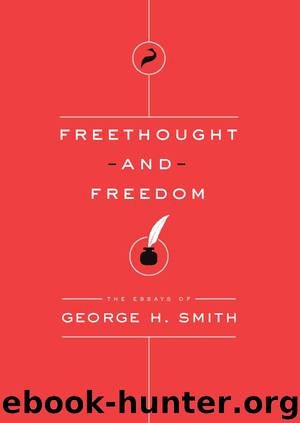Freethought and Freedom by George H. Smith

Author:George H. Smith
Language: eng
Format: epub
Tags: ebook
Publisher: CATO Institute
Published: 2017-06-30T16:00:00+00:00
In the Treatise, Spinoza attempted to render the Bible useless as a source of knowledge—at least for those who are able to reason philosophically. Biblical narratives, he argued, may sometimes illustrate moral precepts, such as justice and charity, but unaided reason can discover those virtues as well, without recourse to revelation (and with more certainty). So of what use is the Bible? Spinoza replied that most people lack the inclination or ability to follow a long chain of philosophic reasoning, so they must learn their morality from easily digested stories and examples. That is where the Bible plays an important role. It does not provide definitions or proof, so it cannot provide the knowledge available through reason; but the Bible’s “sayings and reasonings are adapted to the understanding of the masses.” Belief in the Bible (or certain parts of it) “is particularly necessary to the masses whose intellect is not capable of perceiving things clearly and distinctly.” In addition, ordinary people are likely to read biblical stories without grasping their moral import, so the masses “are always in need of pastors or church ministers to explain them to their feeble intelligence.”
Spinoza’s derogatory remarks about the “masses” exhibited an intellectual and moral elitism that would run throughout the history of freethought well into the 18th-century Enlightenment. Voltaire, for example, regarded Christian doctrines as unworthy of enlightened minds, while insisting that those selfsame doctrines were necessary to keep the unenlightened masses from running amok, morally speaking. But not all freethinkers shared this attitude. Many 18th-century freethinkers—such as the deists Peter Annet, Thomas Chubb, and Thomas Paine—specifically tailored their anti-Christian tracts for the common man, believing that the average person is capable of thinking for himself and arriving at rational judgments; and that attitude became dominant among 19th-century freethinkers. Government authorities typically regarded the “vulgar” popularization of freethought as a greater threat to the religious and political status quo than the more sophisticated treatments intended for academics and intellectuals. Nevertheless, when modern historians discuss the history of freethought, they almost always focus on the academic freethinkers; they typically dismiss those I call the “street freethinkers”—who wrote in a style that would appeal to the masses—as unworthy of serious consideration.
For Spinoza, as for many deists, the essence of a good religion is its ability to improve moral conduct. A person may believe every word of the Bible, but if that belief does not make him more virtuous, “he might employ himself just as profitably in reading the Koran or the poetic drama, or ordinary chronicles.” In contrast, a person may be wholly ignorant of the Bible or deny its divine status, but if he is a good person who leads a moral life, then “he is absolutely blessed and truly possesses in himself the spirit of Christ.” The natural light of reason, for those skilled in its use, is sufficient to show us “the true way of salvation.”
With this background, we can understand why the Theologico-Political Treatise generated a maelstrom among Spinoza’s contemporaries and for many decades thereafter.
Download
This site does not store any files on its server. We only index and link to content provided by other sites. Please contact the content providers to delete copyright contents if any and email us, we'll remove relevant links or contents immediately.
| Anthropology | Archaeology |
| Philosophy | Politics & Government |
| Social Sciences | Sociology |
| Women's Studies |
The remains of the day by Kazuo Ishiguro(8956)
Tools of Titans by Timothy Ferriss(8354)
Giovanni's Room by James Baldwin(7308)
The Black Swan by Nassim Nicholas Taleb(7092)
Inner Engineering: A Yogi's Guide to Joy by Sadhguru(6779)
The Way of Zen by Alan W. Watts(6584)
Asking the Right Questions: A Guide to Critical Thinking by M. Neil Browne & Stuart M. Keeley(5745)
The Power of Now: A Guide to Spiritual Enlightenment by Eckhart Tolle(5736)
The Six Wives Of Henry VIII (WOMEN IN HISTORY) by Fraser Antonia(5490)
Astrophysics for People in a Hurry by Neil DeGrasse Tyson(5172)
Housekeeping by Marilynne Robinson(4428)
12 Rules for Life by Jordan B. Peterson(4293)
Double Down (Diary of a Wimpy Kid Book 11) by Jeff Kinney(4254)
The Ethical Slut by Janet W. Hardy(4235)
Skin in the Game by Nassim Nicholas Taleb(4228)
Ikigai by Héctor García & Francesc Miralles(4228)
The Art of Happiness by The Dalai Lama(4118)
Skin in the Game: Hidden Asymmetries in Daily Life by Nassim Nicholas Taleb(3983)
Walking by Henry David Thoreau(3943)
